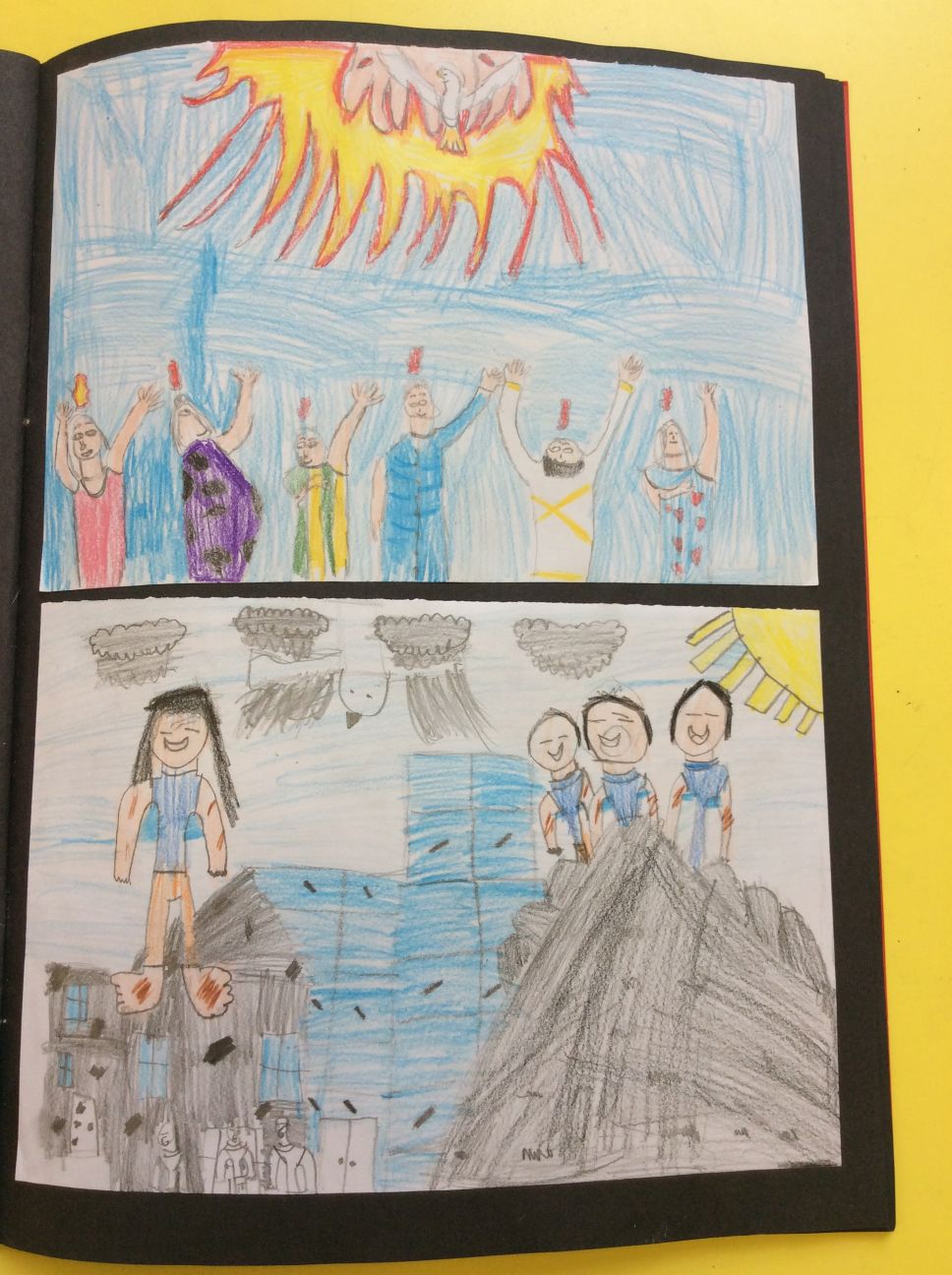RE
Vision and intent for RE (Religious Education)
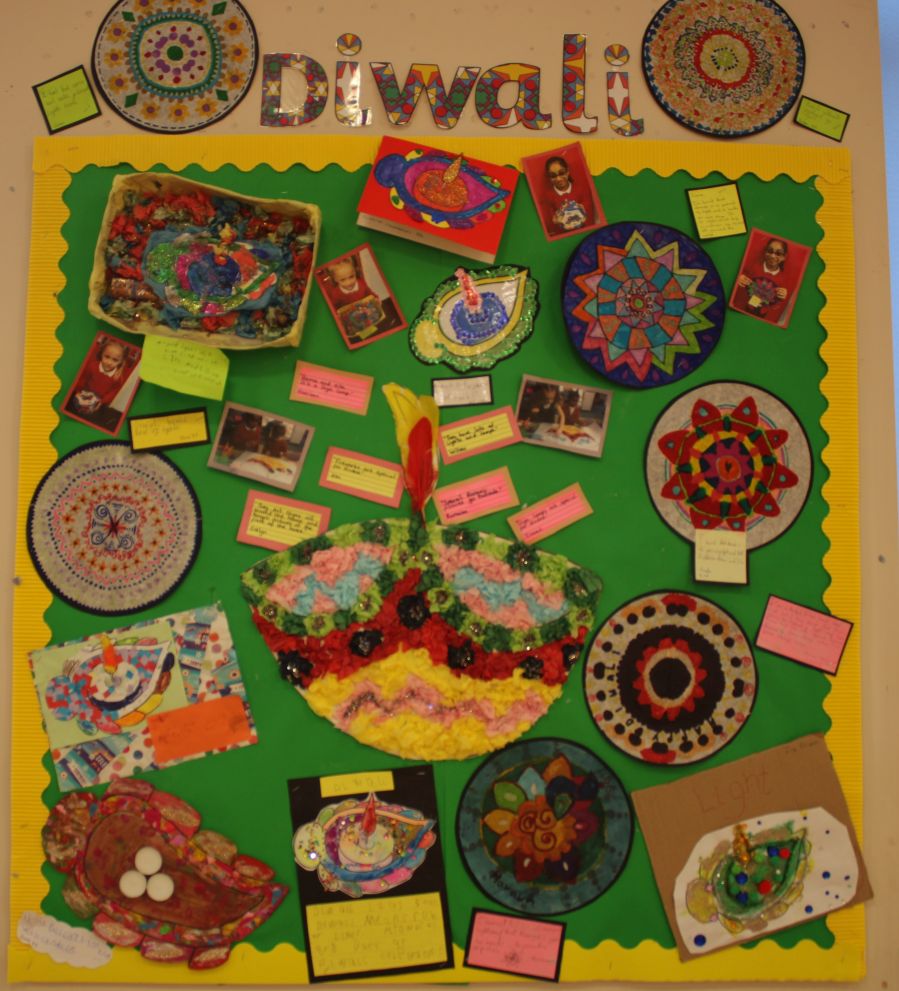

Our aim at Temple Meadow is to make teaching and learning as enjoyable as we can. To that end, we adopt an Irresistible Learning approach to our curriculum – packaging learning in a way that allows us to create memorable and adaptable learning experiences which include all National Curriculum requirements.
The Religious Education and Collective Worship Policy at Temple Meadow Primary School pays due regard to statutory requirements as outlined in the 1988 Education Act and takes account of the local authority guidance through SACRE (Standing Advisory Councils for Religious Education).
Temple Meadow values an integrated approach to learning involving both inside and outside of the school environment. We provide a broad and balanced curriculum which encompasses spiritual, moral, social and cultural development; which is in accordance with the locally-agreed Sandwell syllabus.
Religious Education (RE) is taught discretely within the school curriculum. The long-term plan and curriculum map outline the key units that must be taught in each year group every half term. These units have been provided by the SACRE Sandwell Syllabus and have also been supplemented by the Understanding Christianity units to support teaching and learning. With regards Collective Worship, both our RE curriculum and our overarching Temple Meadow Values support our Collective Worship content.
Policy aims
Our policy aims to ensure that:
- All pupils are provided with a balanced and broad curriculum which encompasses the traditions of Great Britain as well as a variety of other mainstream religions and beliefs.
- All staff members are aware of planning, assessment, teaching and learning requirements for the RE curriculum.
- All pupils know how to plan, practise and evaluate their work.
- All pupils experience all elements of RE, as per the Sandwell syllabus.
- All pupils receive high quality teaching and learning experiences linked to RE and Collective Worship.
Our values align with RE and Collective Worship and that our approach supports our community cohesion.
Linked policies
- RE Teaching and Learning policy
- Vision and values policy.
Legal framework
This policy has due regard to legislation including, but not limited to, the following:
- The Education Act 1996, section 375
- The Education Act 2002, section 78
- The School Standards and Framework Act 1998
This policy also has due regard to guidance, including, but not limited to, the following:
- DfE (1994) ‘Religious Education and Collective Worship’
- DfE (2021 ‘Statutory framework for the early years foundation stage.
Parental right to withdraw from RE and collective worship
Parents have the right to withdraw their child from RE or Collective Worship.
- Parents must put this in writing and discuss with the Headteacher.
- Any pupil who is withdrawn from an act or acts of Collective Worship will be supervised appropriately.
Cultural capital considerations for RE
Given our context linked to high levels of deprivation, we are aware of the high need to support development of Temple Meadow pupils’ cultural capital. This is key to their future success in their next stage of education and in future life and in understanding the diverse society we live in and the range of religions and cultures we are surrounded by . We plan to ensure that the experiences we provide through our RE curriculum and by connecting learning across subjects, gives them confidence and the capacity to succeed in the future and to support a long term aspiration of all pupils achieving in society.
Implementation of RE
We ensure pupils gain a clear understanding of often complex concepts by ensuring we allow for concrete and hands on learning as a means to develop abstract understanding. For example, to gain a secure understanding of what different religious people believe and the materials they use to help them worship and also how there are many similarities and differences across the 5 main religions that we learn about at Temple Meadow.
National Curriculum coverage
RE is a statutory subject within the school curriculum for all pupils aged between 5 and 19. Parents have the right to withdrawn their child from RE. This needs to be done by writing to the Headteacher. All schools must provide RE in line with the National Curriculum requirement as it is a compulsory subject.
The Sandwell Syllabus and Understanding Chrisitanity resources and planning documents are used to support planning using the standard Temple Meadow planning performa
Strands and Long Term Plan
We have an RE curriculum map which maps the learning for RE really clearly.
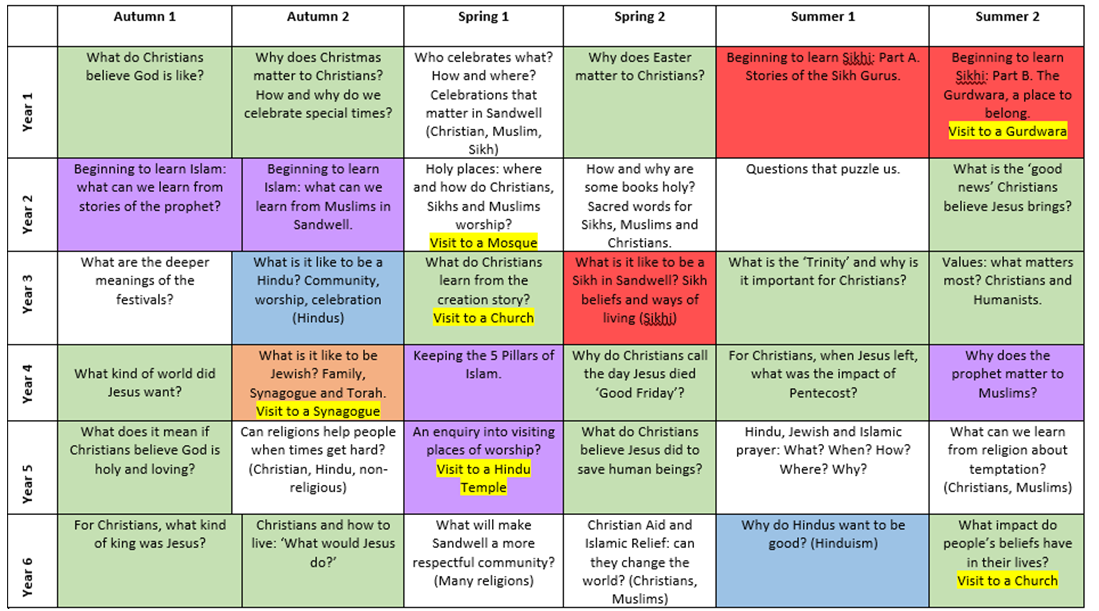
T&L approaches including enquiry approach
We feel that RE is best delivered around enquiry and that religious enquiry is an active process of investigation in which pupils are fully engaged. We therefore focus our RE teaching around enquiry with each learning episode including key questions and learning to understand peoples’ beliefs.
We have therefore graded the enquiry questions in our learning episodes as Gold, Silver, Bronze. The grid below the hierarchical impact of these questions. This grid supports teacher planning and raises pupil awareness of effective questioning.
Enquiry based approach ensures:
- We use thinking time effectively.
- That we improve responses to questions to lead to more targeted, detailed and developed answers.
- We unpick reliability, viewpoints and challenge ideas.
- We improve engagement and focus.
- We challenge and extend ideas and improve understanding.
- We support pupils to question to a deeper level with focus and insight.
All our RE lessons at Temple Meadow Primary School will follow an enquiry based approach.
Enquiry based approach ensures:
- We use thinking time effectively.
- That we improve responses to questions to lead to more targeted, detailed and developed answers.
- We unpick reliability, viewpoints and challenge ideas.
- We improve engagement and focus.
- We challenge and extend ideas and improve understanding.
- We support pupils to question to a deeper level with focus and insight.
Teaching and learning approaches
Teachers encourage pupils to discuss topics covered in RE, orally with their peers and as a whole class.
During RE lessons, sufficient time is given for pupils to discuss, plan, edit and revise their work.
To support understanding of content, we utilise our Temple Meadow collaborative techniques as well as:
- Storytelling
- Adult-led activities
- Child initiated activities
- Debating
- Dramatic performance.
To improve communication and language in the classroom, teachers will encourage pupils’:
- Organisation, clarification and sequencing of thoughts, feelings and ideas.
- Development of their own narratives in relation to the stories they hear in lessons.
- Exploration of their feelings and emotions towards set narratives.
All our RE lessons at Temple Meadow Primary School will follow an enquiry based approach.
Enquiry based approach ensures:
- We use thinking time effectively.
- That we improve responses to questions to lead to more targeted, detailed and developed answers.
- We unpick reliability, viewpoints and challenge ideas.
- We improve engagement and focus.
- We challenge and extend ideas and improve understanding.
- We support pupils to question to a deeper level with focus and insight.
RE overview (Long Term Plan)
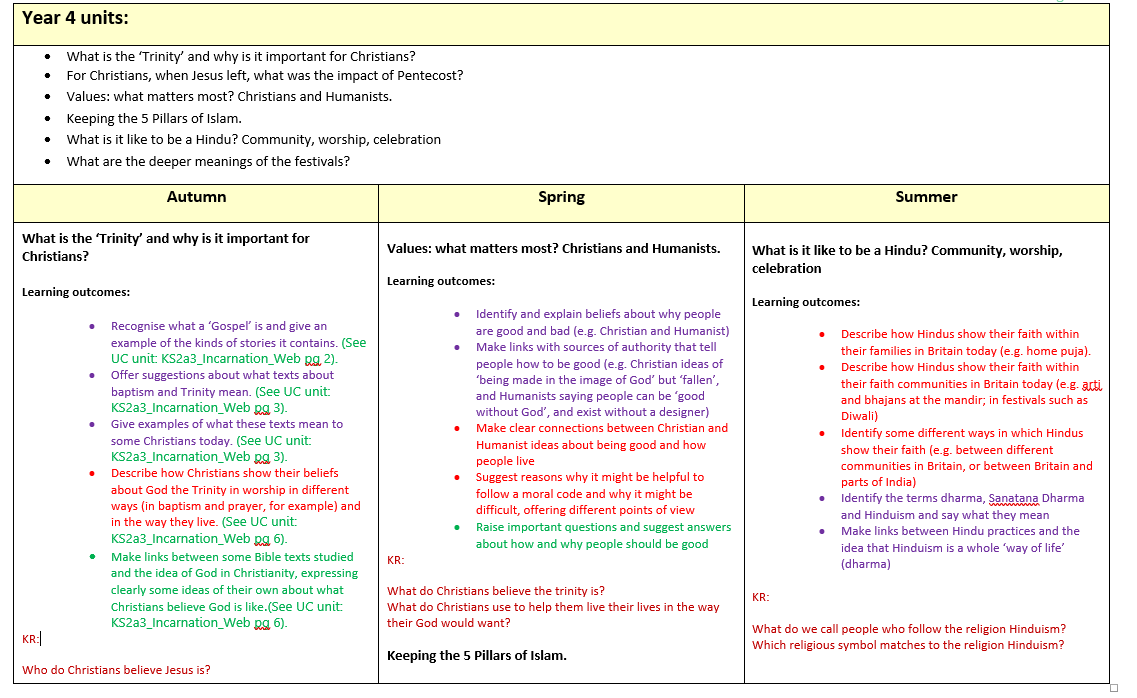
Teacher view of the importance of RE
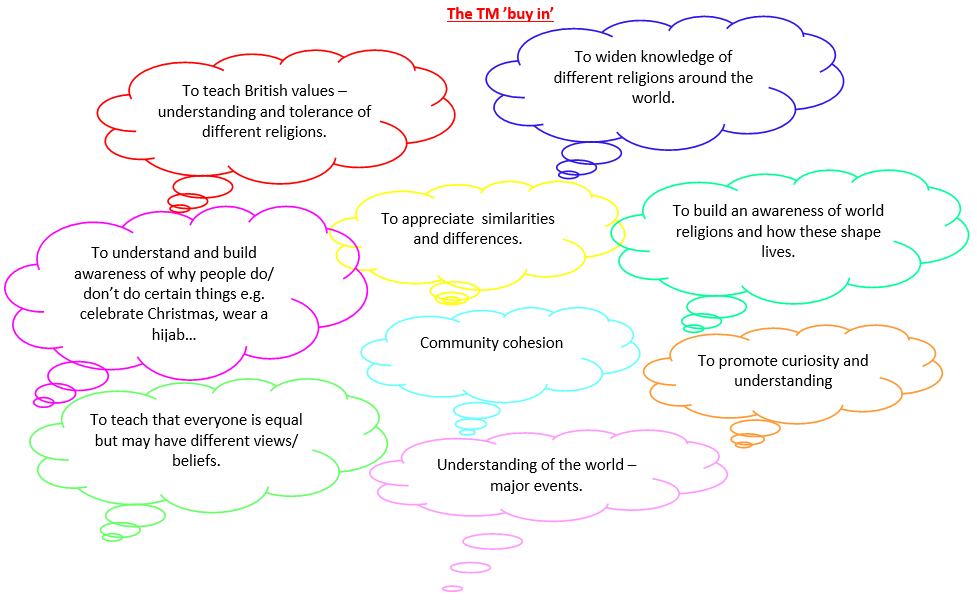
Knowledge organisers
Our aim is for quality delivery and clarity of definitions throughout the school, supporting progression of knowledge and skills. Therefore, supporting each religion that is taught, there is a Knowledge Organiser.
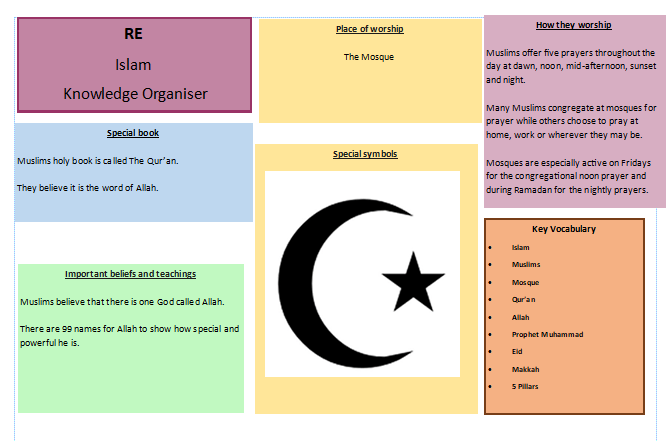
Timetabling
RE is taught discreetly and there is a clear timetable slot for each year group. There is an expectation of 5 lessons to be taught each half-term. Lessons are typically one hour.
Vocabulary
Vocabulary has high focus and children are expected to develop a secure understanding of required religious terminology.
Learning episodes
Our Learning episodes ensure that pupils appreciate and respect what they are learning about and they are clear regarding the RELI (Religious Education Learning Intent).
Retrieval practice
Learning episodes cater for knowledge and retrieval and support long term memory retention by retrieval of previous sessions and from sessions over time.
Inclusion and equal opportunities
- Teachers are always mindful of inclusion and differentiation. Learning must meet the needs of all pupils.
- All pupils will have equal access to the RE curriculum.
- Learning ability, physical ability, linguistic ability, gender, ethnicity and/or cultural circumstances will not impede pupils from accessing RE lessons. Reasonable adjustments will be made by the class teacher to support pupils and specialist circumstances.
- Cultural and gender differences are positively reflected in RE lessons and the teaching materials used.
Making connections to other subjects
We make smart links to English, History and Art and DT.
Enabling learning environments
All teachers to use the ‘Religion cards’ at the beginning of each lesson to introduce to the children what religion they will be focusing on that day. This will help children to learn the symbols for each religion.

Resources
All pupils will explore artefacts and resources linked to the religions they are learning about. These will be used frequently in learning episodes to build understanding and enable children to handle the objects where appropriate and to encourage their respect.
All RE resources can be found in the resource cupboard in the studio, clearly sorted into labelled boxes with the religion name.
Assessment, monitoring and review
Assessment and reporting
- Formative assessment is carried out routinely throughout the year. Assessment is carried out at the end of each lesson e.g. through a collaborative chart in the Collaborative RE book; this shows a clear measure of pupils’ development throughout each unit.
- Summative assessment is carried out at the end of a unit of work. Teachers use the results to assess pupils’ overall achievement for each half term, against each learning outcome. This data is logged onto Learning Ladders. Also, this information will be passed on at the end of the school year to each pupil’s future teachers, in order to measure how well a pupil has progressed at any given time in their education.
- Parents will be provided with a written report about their child’s progress during the Summer term every year.
RE Learning Ladders
Throughout the teaching of each RE unit, teachers assess against a pupil’s understanding using an online assessment trackers (Learning Ladders). Throughout the academic year, these are updated based on a pupil’s attainment.
This assessment is completed after the lesson has been taught and the outcomes are used to complete the assessment. To assess the children each child needs to be assigned either as a “1”, “2”, or “3” (1= emerging, 2= developing and 3= secure). Each lesson focuses on 1 rung which can be assessed at the end of the session.
The impact of teaching and learning is then measured. Teachers take ownership of their own assessment data and appraise whether a particular objective needs revisiting at a later date through a Knowledge Retrieval practice. Analysis of Learning Ladders is also conducted by the RE lead on a termly basis. The analysis is shared with teachers and SLT and is used to inform the curriculum lead’s action plan and subsequent subject developments and monitoring.
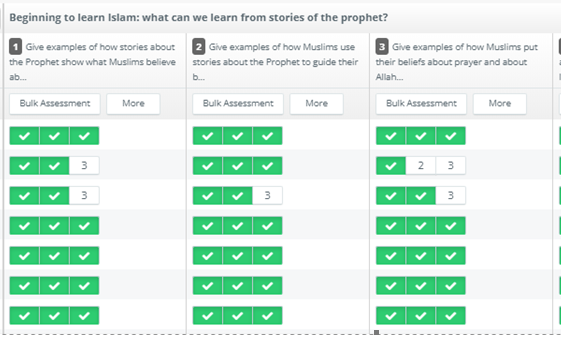
- The RE lead will review the teaching of RE in the school, ensuring that taught content adheres to the Sandwell syllabus. This will take place once a term.
- The RE lead will analyse the RE learning ladder data and provide individual year groups next steps on how to boost learning and data scores e.g. through targeted knowledge retrievals.
- Any changes to the Sandwell syllabus will be communicated to the headteacher.
- Any changes to this policy will be communicated to all teaching staff.
Enrichment
To build Cultural Capital to support lifelong success as learners and citizens the curriculum at Temple Meadow must be experiential, hands on and imaginative. We value enrichment to support our values.
Trips
Each year, Years 1-6 will all visit a place of worship linked to their current RE topic. Hopefully, by the time a child leaves Year 6, they will have had the opportunity to visit a; Church, mosque, Gurdwara, Mandir, Synagogue and a Gurdwara during their time at Temple Meadow. These are fully funded by school as part of our values as we believe this supports community cohesion by building community understanding.
Visits
Visits from people of different religions and faiths will be planned for appropriately to help support children’s learning in RE, depending on their topic.
Pupil Voice - RE Ambassadors
RE and Collective Worship ambassadors are elected yearly by the class teachers through a simple voting process. Initially children who show interest need to give a few simple reasons as to why they want to be an ambassador. Then their peers vote for the person they feel will undertake this role the most effectively. The RE co-ordinator will meet with the ambassadors to explain their roles. During the first meeting they are given a RE/CW Ambassador enamel pin to ensure other children in the classroom know what their role is.
The role includes:
- Reminding teachers to complete Collective Worship using their allocated slot.
- Support with the respectful management of RE resources in the classroom.
- Ensure RE resources are safely put away in the RE boxes.
- Stick pieces of Collective Worship work into the RE collaborative books.
The RE coordinator will meet with the ambassadors often to ensure they are carrying out their tasks appropriately and will at times provide the children with the Collective Worship planning, so they can continue to remind teachers to complete this at an appropriate time.
Collective Worship
Statement of intent for Collective Worship
The Religious Education and Collective Worship Policy at Temple Meadow Primary School pays due regard to statutory requirements as outlined in the 1988 Education Act, and has taken account of the guidance offered by the local authority through SACRE (Standing Advisory Councils for Religious Education).
At Temple Meadow Primary school, we see the value in collective worship and adhere to our statutory duty by providing 10 minutes of collective worship every Tuesday and/or Thursday. This time will enable pupils to explore their own beliefs and consider spiritual and moral issues. The act of daily collective worship will be wholly or mainly of a broadly Christian character; however, as we are a non-faith school, other faiths and cultures will be represented. Collective worship provides the opportunity for the school to meet together in a variety of contexts and enables participating pupils and staff to consider events of the world and appreciate the rich tapestry of human experience and existence.
Definition of Collective Worship
- “Collective Worship” is a time when the whole school, or groups within the school meet together in order to consider and reflect on common concerns, issues and interests. It offers all pupils an opportunity to worship through engaging in relevant, meaningful experiences and provides opportunities for the pupil’s spiritual, moral, social and cultural development.
- To “take part” in collective worship implies more than a passive attendance, such that it should have the ability to elicit responses from pupils even though they may not feel able to actively identify in the act of worship on a particular occasion.
Aims of Collective Worship
For the School:
Collective Worship contributes significantly to the ethos of Temple Meadow Primary School and it is our aim that it is a time when the school community can:
- share common aims and values by giving pupils the opportunity to plan, lead or contribute to discussions on key themes and topics, e.g. morality.
- celebrate achievement and special times
- explore together the world in which we live via active involvement or through listening and participating in the worship offered.
- develop a community spirit.
- provide a peaceful environment to enable stillness, prayer and reflection.
- acknowledge diversity and affirm each individual’s life stance, whether religious or not.
- reinforce positive attitudes.
For Pupils:
We also intend that Collective Worship contributes to the development of the pupil as a ‘whole’ person by providing opportunities to:
- consider spiritual and moral issues
- explore their own beliefs
- develop their own spirituality
- reinforce positive attitudes
- help pupils to develop an awareness of their community and the spirit of helping others.
- participate and respond
- reflect on what it means to be human.
How Collective Worship fits within the Curriculum
Collective Worship time is distinct from curriculum time. However, at Temple Meadow Primary School, Collective Worship will at times feature aspects of the curriculum, which will enhance the experiences of pupils by reflecting on the work done in classes. At times, Collective Worship will enrich classwork through its consideration of subject matter from different perspectives.
The provision of opportunities for pupil’s spiritual, moral, social and cultural development is in line with school policy which informs our practice. To ensure Collective Worship provides opportunities for spiritual, moral, social and cultural development, it should address a wide variety of themes and topics, use diverse stimuli and resources and provide pupils with the opportunity to ‘respond’ on their own level.
Management of Collective Worship
- The RE lead plan the provision of Collective Worship across the school and monitors and evaluates provision.
Organisation of Collective Worship
- Collective Worship is mapped according to prevalent themes, special occasions and events, but may be amended as and when necessary to allow the inclusion of current and topical school, local and world issues. The overview plan is up dated throughout the year.
- Collective worship will normally take place in the classroom and usually last for approximately 10 minutes. It is recognised that this time will be shortened or lengthened when it is appropriate.
- The school will implement collective worship in line with advice given by the Standing Advisory Council on Religious Education (SACRE).
- Every pupil will participate in the act of collective worship unless they have been withdrawn in line with the “right to withdraw” section of this policy.
- Worship will be of a broadly Christian character; however, there will be influences from other religions found in the local community.
- The RE subject lead is responsible for creating the collective worship overview.
Ensuring Collective Worship sustains
- All teaching staff and occasional visitors will be involved in leading acts of worship at some point in the school year.
- The RE lead will meet with the R.E/C.W. ambassadors, once every half-term to discuss whether Collective Worship sessions are taking place and, to remind them that they are responsible for reminding teachers to do this in class.
Planning Acts of Collective Worship
The content of all acts of Collective Worship will be considered carefully, to ensure relevance and suitability for the ages, aptitudes and backgrounds of all pupils.
The Act of Collective Worship
- A variety of teaching and learning styles and active and interactive methods are appropriate in acts of Collective Worship and a variety of resources can be used. Teachers will choose the style/method and resources which are appropriate to the content, the age, aptitude and the background of the pupils.
- The content and process must be sufficiently stimulating in order to evoke a response in the individual. Opportunity must be given to express this response through reflection.
- We consider pupils of different ages and abilities when delivering the collective worship programme.
Collective Worship Overview
Please see Collective Worship Overview which maps focus and reflection. This grid is kept in S: Drive/Curriculum Design 2021/2022/R.E/ See below for a sample of how this looks:
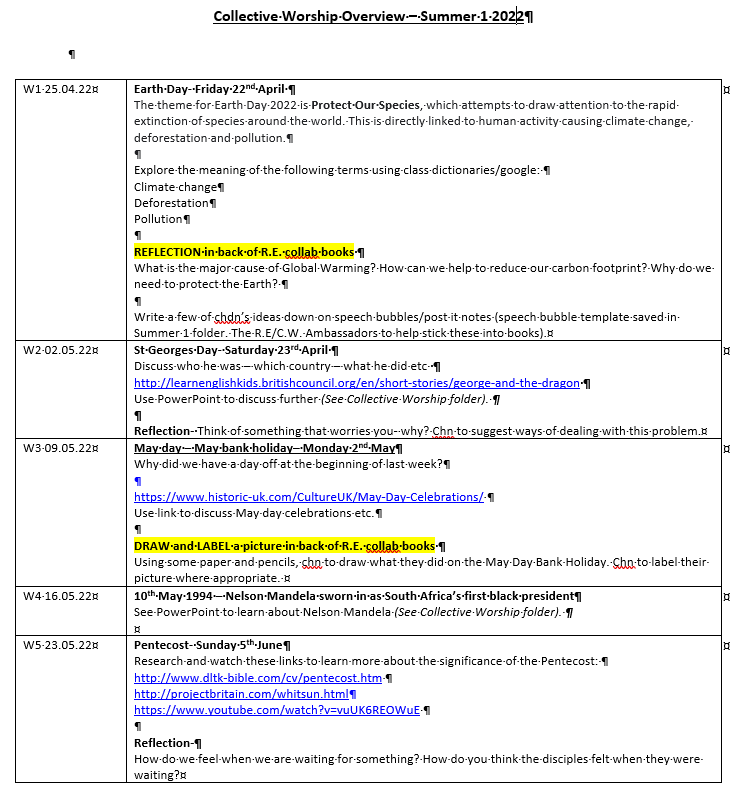
Showcase of work
